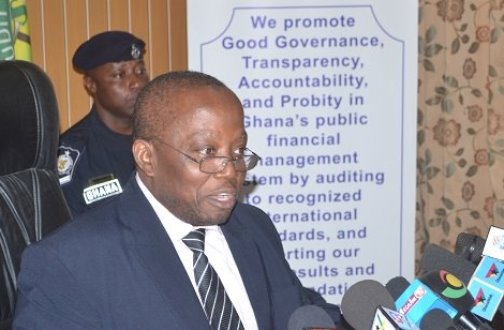Pressure group, OccupyGhana, is calling on president Nana Akufo-Addo to direct the Auditor-General to audit all “impugned transactions” in the wake of the contract for sale documentary.
The head of the Public Procurement Authority (PPA) Mr. A.B. Adjei is currently on suspension awaiting investigations by the special prosecutor and CHRAJ over allegations of conflict of interest among other infractions. He was exposed in a documentary allegedly selling contracts after winning them through his company.
Reacting to the news, OccupyGhana said: “We believe that there are grounds for further action by the President, acting in accordance with the advice of the Council of State, requesting the Auditor-General in the public interest, to audit all of the impugned transactions under article 187(8) of the Constitution. This audit should not be limited to the PPA but should also target the relevant ministries, departments and agencies that entered into the impugned contracts, with a view to disallowing all illegal transactions and surcharging public officers and the contractors with any payments made.”
It added: “It is in the light of the foregoing that we call upon the Executive and Parliament to take immediate steps to pass into law the long-standing Code of Conduct for Public Office Holders Bill. There is no justifiable or acceptable reason for the failure to pass that into law. Public office holders ought to know that there would be painful legal consequences for engaging in conflict of interest and conflict of duty acts.”
Below is the full statement:
OCCUPYGHANA® PRESS STATEMENT
OCCUPYGHANA® DEMANDS FIRM ACTION ON THE PUBLIC PROCUREMENT AUTHORITY AND COLLAPSE OF FINANCIAL INSTITUTIONS MATTERS
OccupyGhana® is saddened by recent developments in Ghana, particularly relating to the Public Procurement Authority and the collapse of several banks, non-bank financial institutions and deposit-taking institutions. We demand firm action that will result in root and stem reforms, and punish wrongdoing.
PPA DOCUMENTARY
The documentary produced by Manasseh Awuni is disturbing. It suggests a system that has been put in place, well-rehearsed, properly honed and perfected to beat the well-intentioned Public Procurement Act, 2003 (Act 663).
We recall that when that Act was first passed, it was hailed as a solution to the absolutely corrupt and corrupted procurement system that existed at the time. Yet the Act was breached by the very government that passed it in the infamous Macmillan books contract saga, leading to the 18th October 2006 judgment in Republic v. Ministry of Education & Sports and 2 Others, ex parte Ghana Book Publishers Association, which excoriated the government for the breaches and set that contract aside. It is instructive that the PPA has operated as if this judgment does not exist.
The Act provides two exceptions to the general rule on competitive tendering for government contracts, namely single source procurement and restricted tendering. What we have seen is that these exceptions have become the rule, in a cynical attempt to evade the strict provisions of this law. In the Bus Branding saga, civil society organisations protested about an alleged abuse of the law, where “national security considerations” were laughably cited as one of the reasons for giving out the single sourced contract, and where payments made to the contractor from government coffers were designated as payments for a “Western Corridor railway project” at “Osu, Accra.” The results of the investigations allegedly conducted by the then Attorney-General and submitted to government, remain hidden from Ghanaians to date. We are not aware that any person was prosecuted for that, although we have strong cause to believe that the then Attorney-General recommended prosecutions. In more recent times, civil society has protested about an alleged abuse of restricted tendering in the KelniGVG deal, which strongly suggested that the process was rigged to produce a pre-determined winner. We are not aware of any official investigations into that matter.
We also note that within months after the Act was amended in 2016 to provide for a stricter regime for disposing of government vehicles, the same government that introduced the amendment, sold hundreds of vehicles at ludicrously low prices to its departing ministers and other public officials, in complete breach of the provisions of the Act. The transactions have not been set aside and no one has been punished for that.
When successive governments engage in such complicit acts and omissions that are never punished, they encourage others to do the same or take the breaches a notch higher, comforted and emboldened by the knowledge that breaching the law has no consequences. If investigations into this new saga prove wrongdoing, that would be largely due to government repeatedly turning a blind eye to previous breaches and thereby encouraging others to do the same.
That is why we are gratified with the President referring this matter to both the Office of the Special Prosecutor and the Commission on Human Rights and Administrative Justice. We are even more gratified by the almost instantaneous reaction of the OSP. We are waiting to see similar first steps from CHRAJ. We believe that there are grounds for further action by the President, acting in accordance with the advice of the Council of State, requesting the Auditor-General in the public interest, to audit the all of the impugned transactions under article 187(8) of the Constitution. This audit should not be limited to the PPA but should also target the relevant ministries, departments and agencies that entered into the impugned contracts, with a view to disallowing all illegal transactions and surcharging public officers and the contractors with any payments made.
It is in the light of the foregoing that we call upon the Executive and Parliament to take immediate steps to pass into law the long-standing Code of Conduct for Public Office Holders Bill. There is no justifiable or acceptable reason for the failure to pass that into law. Public office holders ought to know that there would be painful legal consequences for engaging in conflict of interest and conflict of duty acts. We also remind public office holders of the requirement to declare their assets and liabilities upon appointment, every four years and upon leaving office. We demand an amendment to the Public Office Holders (Declaration of Assets and Disqualification) Act, 1998 (Act 550) to make it a criminal offence for any eligible public office holder to fail, neglect or refuse to declare their assets and liabilities in accordance the law.
FINANCIAL SECTOR
We express our unreserved and unalloyed support for the steps taken by the Bank of Ghana to address the contagion that hit the financial sector. Sadly, the effect has been massive with the potential of loss of funds and job losses. It is blindingly obvious that if the Bank of Ghana had taken preventive and early corrective steps (which it was empowered to do even under previous laws) to address these matters when they first began, the tide could have been stemmed and damage limited.
However, the Bank of Ghana and its leadership at the time simply sat by and watched things deteriorate, and in some instances just poured more money into banks that had already breached the law and misused depositors’ funds. Even when the Bank of Ghana’s own investigations showed blatant breaches of the law by licensed operators, the Bank of Ghana inexplicably did nothing.
It also beggars belief that to date, the government has not commenced any prosecution against any persons who are alleged to have been involved in the acts that have led to the current melt down, or informed Ghanaians that after due investigations, there are no bases for any prosecutions. This unpardonable silence by government is in part to blame for the eroding confidence of Ghanaians in the system. Nobody ever gets punished for anything.
What is worse, the Bank of Ghana and government have been aware of several illegal deposit-taking institutions (often blatant Ponzi schemes) operating in Ghana, and who simply disappear with depositors’ monies at the end of the day. The Bank of Ghana has done its part by issuing warnings to the operators and then publishing (admittedly few and far between) notices that warned the public not to deposit monies with such institutions.
We are not aware of any attempt by government to prosecute any of the offending companies and their directors for the blatant illegalities. Indeed, there appears not to be any completed prosecution of any of such persons in Ghana’s history. The recent comedic drama and risible pantomime on these matters show that we have simply failed to apply the law, for reasons that we simply cannot fathom.
We conclude by calling on the government to make the law work, irrespective of whose ox is gored. A great and strong nation must be bold to defend forever, the cause of freedom and of right.
Yours in the service of God and Country
OccupyGhana®
Source: Ghana/Starrfm.com.gh/103.5FM




